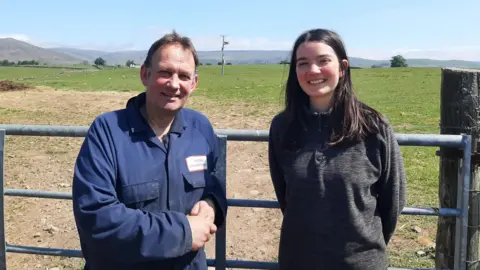'How muscular dystrophy changed life on our farm'
 BBC
BBCA farmer living with a degenerative disease has shared how he adapted life on the farm to overcome the challenges of his condition.
Andrew Laidlow, 52, has muscular dystrophy - a progressive condition which causes muscles to weaken.
Handling sheep, climbing up and down a tractor and carrying out maintenance work at his farm in Dufton, near Appleby in Cumbria, may have become difficult tasks, but with support from his family and a few adaptations, he continues to run the business.
"I've got so much going for me in life at the minute and I live in such a beautiful place," he said.
"You do get down thinking about the future from time to time, but really I've got such a good support."
Mr Laidlow's condition means it is hard for him to handle sheep, but instead of giving up farming, they switched from textile sheep to Herdwicks, which are smaller and easier to handle for the rest of his family without his help.
He uses step ladders to get into his tractor and access to the farm has been changed to reduce trip hazards.
"When you're active all your life you don't want to stop, but you just need to adjust things," Mr Laidlow said.
"It's incredibly frustrating, you see something like a gap in a drystone wall, it used to take me half an hour to fix beforehand."
'Getting old quick'
Speaking to BBC Radio Cumbria's Mike Zeller at Breakfast, the father-of-three said he first noticed his symptoms at the start of the coronavirus lockdown, when he found it hard to get into the tractor or climb the stairs at night.
"I know when you get tired and a bit achy at night sometimes all of those are difficult, but it just seemed to be too consistent," Mr Laidlow said.
Initially he thought it was a result of being unfit and overweight, so he tried to address that and attended appointments with chiropractors and physiotherapists.
It was one of those professionals who suggested his problems might stem elsewhere, which kickstarted the process of receiving a diagnosis.
"It was a shock obviously, because when you start reading up about it - it's the beginning of a lifechanging thing," Mr Laidlow said.
"But in the same breath - and I know it sounds stupid - I was a bit relieved that I was diagnosed with something, because I was thinking 'I'm getting old too quickly, I can't continue doing what I'm doing for a living'."
Accessible countryside
With support from his family and careful planning, he has adapted farm life to work for him, but also for others who may struggle with their mobility.
His daughter Katie, 18, who also works on the farm, said they worked to make footpaths on their land more accessible.
"We tried our best to replace stiles with gates," she said.
"Just simple things like making sure they're wide enough to allow wheelchairs and pushchairs - it does affect everybody really."
The teenager recently ran the Manchester marathon in aid of charity Muscular Dystrophy.
The event day was the first time she ran on roads, having trained on the farm, fields and surrounding fells.
"Living here with a hill in every direction I go in, I do think it helped me massively for running the marathon - I think it improved my overall stamina and endurance," she said.
